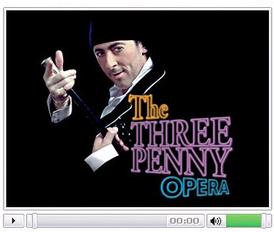The Threepenny Opera
2006 Roundabout Theater Company Revival
In 2006 the Roundabout Theater Company presented Bertolt Brecht and Kurt Weill's "The Threepenny Opera staring Cyndi Lauper and Alan Cumming. Wallace Shawn provided a new translation for this latest version. It was the first major production of the play since 1990.
This was the official website for the 2006 revival.
Content is from the site's 2006 archived pages, as well as from other outside sources.

Tony Awards 2006 - Three Penny Opera
Lyrics
Guy: So long ago her soul and mine entwined
We shared out things together happily
I used my mind and I protected her
She used her body and supported me
To be poor is an illness
And this was the cure
So when a customer apeired I'd leave out bed
I'd go outside and I'd prepair some cheese and bread
So when he paid and could have a snack
And I'd say if ya like her please come back
And then you'd wash beneth the golden dome
Of that cold brothel that you and I called home
Girl: For half a year, his soul and mine entwined
He touched me sweetly with a lovers touch
And when the cash was gone he said, "We'll sell your ring,
We have to eat my love, so please don't cry too much.
The ring, who needs it? We wanted to survive"
And I remember once I said that that's not fair,
He knocked me down and slapped my face and pulled my hair,
And later on one time he hit me with a stick
And I laid down because I felt quite sick
Both: So life was sweet beneth that golden dome
In that cold brothel were we made out home.
And in those days, so very long ago..
Guy: Things weren't as sad and grim as they are now.
Girl: Its true we made love only in the day,
Guy: By night the farmers girl had to pull the plow
It wasn't normal, but we could still play,
Girl: Then I got Pregnant and by you, you will agree.
Guy: So when we F*** shed always sit on top of me
Girl: Be cause he didn't want to hurt our little child
Guy: And then it died one night in may and she went wild
Both: We said goodbye, in June beneth the dome,
Of that cold brothel which we called our home.
(Music out)
(Thanks go to MayaIronic for the lyrics)
Jon Alwing, Stage Right: As a fervent admirer of Bertolt Brecht and Kurt Weill, approaching any revival of their seminal work, "The Threepenny Opera," comes with a mix of anticipation and apprehension. The 2006 Roundabout Theater Company production, under the guidance of Scott Elliott and with a new translation by Wallace Shawn, certainly stirs this pot of complex emotions, delivering a performance that is as enthralling as it is contentious.
First and foremost, the portrayals by Alan Cumming and Cyndi Lauper stand out as the production's crowning achievements. Cumming's Macheath, complete with a defiant mohawk, breathes a contemporary edge into the character without detracting from the essence of Weill's music or Brecht's sociopolitical commentary. Lauper, as Jenny, manages to convey the depth and duality of her character with a performance that is both captivating and moving. The chemistry between the two is palpable, bringing to life the opera's central relationships in a manner that is both innovative and respectful to the original material.
The production values, particularly the costumes designed by Isaac Mizrahi, deserve special mention. They adeptly mix the traditional with the modern, contributing to the show's unique atmosphere and helping to transport the audience into a world that feels both timeless and immediate. This blend of eras is further evidenced in the staging and set design, which incorporate modern elements that enhance the narrative without feeling anachronistic. From the neon signs to the minimalist sets, the design choices serve to underscore the opera's themes of corruption and societal decay.
Musically, the performance is a triumph. The adaptation of Weill's score for contemporary audiences is executed with care, maintaining the integrity of the original while making it accessible to those perhaps less familiar with the composer's work. Songs like "Pirate Jenny" and "The Ballad of Sexual Dependency" resonate with a renewed vibrancy, thanks in no small part to the cast's stellar vocal performances and the innovative direction.
However, not all modernizations land as intended. The repeated references to women's golf clubs as murder weapons, initially a humorous nod to modernizing the narrative, quickly devolve into a tired meme. This choice feels at odds with the otherwise clever adaptations and undermines some of the opera's more serious undertones. The humor, while appreciated, occasionally veers into territory that feels incongruent with the spirit of Brecht's critical social commentary.
Despite these criticisms, the revival of "The Threepenny Opera" by the Roundabout Theater Company is a production that I thoroughly enjoyed and would recommend. The performances of Cumming and Lauper alone make it a must-see, while the innovative staging and adaptation offer a fresh perspective on Brecht and Weill's classic work. Though not without its flaws, this "Threepenny Opera" provides both fans and newcomers alike a thought-provoking, entertaining experience that captures the essence of the original while boldly venturing into new territory.
Editor's Comment: One of the most interesting side notes on this Broadway production had to do with what happened in Google upon the US staging. Someone obviously had it out for this show since before it opened there were very negative reviews posted online, most easily findable via Google searches. This definitely impacted ticket sales. The producers attempted to contact the offending review site, as well as Google, to no avail. They even spoke to a service that claimed to be able to delete negative Google results for a fee. They had their lawyers threaten the sites and Google with legal action which was assumed to be a waste of time. The problem kind of fixed itself in the second week, but this experience is a reminder of how powerful Google is and how their mistakes can cause disasters for which no one is held accountable. Google definitely needs to be regulated! Please support all efforts to hold big data to account.

Threepenny Opera: Debauchery, Updated
April 15, 2006
JEFF LUNDEN | www.npr.org/
Heard on Weekend Edition Saturday
In 1928, playwright Bertolt Brecht and composer Kurt Weill were at the cutting edge of German theater. Their adaptation of John Gay's The Beggar's Opera -- which they retitled The Threepenny Opera -- was a major sensation.

Alan Cumming and Cyndi Lauper play Macheath and Jenny, respectively, in The Threepenny Opera
Image credit:Joan Marcus
The highly political show, set in 18th-century London, was populated with a nasty assortment of thieves, cut-throats, beggars, prostitutes and capitalists. Now, a Broadway revival directed by Scott Elliot untethers The Threepenny Opera from its period setting and puts it into a kind of metaphorical present. Playwright and actor Wallace Shawn adapted Brecht's script for the Roundabout Theatre's production, using coarser language than previous translations; the venue is Manhattan's Studio 54.
Many of the cast members of this gender-bending production wear S&M bondage costumes designed by Isaac Mizrahi, and the spare set uses large neon signs to identify locales: a stable, whorehouse, the gallows. Elliot calls it a "theatrical urban landscape."
That landscape is inhabited by an array of artists from wildly differing backgrounds, from theater veterans such as Jim Dale to pop star Cyndi Lauper and Saturday Night Livealum Ana Gasteyer. Performance artists and drag queens appear in some of the smaller roles.
AWARDS
| DRAMA DESK AWARD | |||
|---|---|---|---|
| 2006 | OUTSTANDING FEATURED ACTOR IN A MUSICAL |
|
WINNER |
| DRAMA LEAGUE | |||
|---|---|---|---|
| 2006 | DISTINGUISHED REVIVAL OF A MUSICAL | NOMINEE |
| OUTER CRITICS CIRCLE | |||
|---|---|---|---|
| 2006 | OUTSTANDING FEATURED ACTOR IN A MUSICAL |
|
WINNER |
| THEATRE WORLD AWARDS | |||
|---|---|---|---|
| 2006 | THEATRE WORLD AWARD |
|
WINNER |
| TONY AWARD | |||
|---|---|---|---|
| 2006 | BEST FEATURED ACTOR IN A MUSICAL |
|
NOMINEE |
| 2006 | BEST REVIVAL OF A MUSICAL | NOMINEE |
~~~~~~~~~~~~~~~~~~~~~~~~~~~
• BEST MUSICAL REVIVAL •
TONY AWARD® NOMINATION
BEST FEATURED ACTOR IN A MUSICAL - JIM DALE
WINNER! DRAMA DESK AWARD
WINNER! OUTER CRITICS CIRCLE AWARD
TONY AWARD® NOMINATION
OUTSTANDING DEBUT PERFORMANCE - NELLIE McKAY
WINNER! THEATRE WORLD AWARD
Alan Cumming
Jim Dale Ana Gasteyer
Cyndi Lauper Nellie McKay in
by Bertolt Brecht and Kurt Weill
New Translation by Wallace Shawn
Directed by Scott Elliott
The Threepenny Opera serves up a deliciously dark satire of “respectable” society, with dashing thieves, saucy prostitutes, and lingering melodies. Based on Elizabeth Hauptmann’s German translation of John Gay’s eighteenth-century The Beggar’s Opera, The Threepenny Opera thrusts the audience into the seedy underworld of Mack the Knife, a dapper criminal and his wry love affair with Polly Peachum.
Alan Cumming  (Macheath) returns to Roundabout where he won a Tony, Drama Desk, Outer Critics Circle, Theater World, New York Press, FANY and New York Public Advocate’s Awards as the Emcee in Cabaret and also starred in Noel Coward's Design For Living. In London, he has been seen in Hamlet at the Donmar Warehouse (TMA Best Actor award and Shakespeare Globe nomination), Cabaret (Olivier nomination), La Bete (Olivier nomination), Conquest of the South Pole(Olivier nomination) and seasons with the RSC and RNT, where he won an Olivier Award for his performance in Accidental Death of an Anarchist (which he also co-adapted). Recent films include X2: X-Men United, Spy Kids 3, Nicholas Nickleby, Josie and the Pussycats, Company Man, Titus, Urbania, Eyes Wide Shut, Emma, Circle of Friends, Goldeneye and Buddy. www.alancumming.com
(Macheath) returns to Roundabout where he won a Tony, Drama Desk, Outer Critics Circle, Theater World, New York Press, FANY and New York Public Advocate’s Awards as the Emcee in Cabaret and also starred in Noel Coward's Design For Living. In London, he has been seen in Hamlet at the Donmar Warehouse (TMA Best Actor award and Shakespeare Globe nomination), Cabaret (Olivier nomination), La Bete (Olivier nomination), Conquest of the South Pole(Olivier nomination) and seasons with the RSC and RNT, where he won an Olivier Award for his performance in Accidental Death of an Anarchist (which he also co-adapted). Recent films include X2: X-Men United, Spy Kids 3, Nicholas Nickleby, Josie and the Pussycats, Company Man, Titus, Urbania, Eyes Wide Shut, Emma, Circle of Friends, Goldeneye and Buddy. www.alancumming.com
Jim Dale (Mr. Peachum). 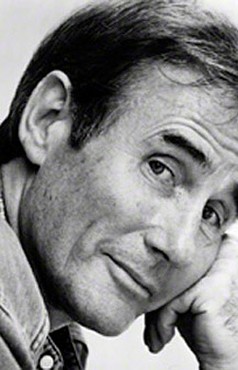 To millions of children Jim is the voice of Harry Potter. So far he has recorded all six books in the series. For his audio work, he has won a record six “Audie Awards” In 2004 Queen Elizabeth II awarded Jim the MBE* for his work in promoting children’s literature. *Member of the Order of the British Empire. Jim has been in show business for over fifty years. At the age of seventeen, he became the youngest professional comedian in the British Music Halls. At the request of Laurence Olivier he joined the British National Theatre in 1969. His work as an actor on and off Broadway include, Scapino, Joe Egg (Roundabout), Privates On Parade (Roundabout), Candide, Me and My Girl, Barnum, Travels With My Aunt, The Music Man, Comedians, A Christmas Carol – The Musical and Address Unknown. In the category of Best Actor he has won a Tony Award, four Tony nominations, four Drama Desk Awards, three New York Critics Awards and the Lucille Lortel Award. In 1967 he received an Academy Award nomination for writing the theme song for the film Georgy Girl.
To millions of children Jim is the voice of Harry Potter. So far he has recorded all six books in the series. For his audio work, he has won a record six “Audie Awards” In 2004 Queen Elizabeth II awarded Jim the MBE* for his work in promoting children’s literature. *Member of the Order of the British Empire. Jim has been in show business for over fifty years. At the age of seventeen, he became the youngest professional comedian in the British Music Halls. At the request of Laurence Olivier he joined the British National Theatre in 1969. His work as an actor on and off Broadway include, Scapino, Joe Egg (Roundabout), Privates On Parade (Roundabout), Candide, Me and My Girl, Barnum, Travels With My Aunt, The Music Man, Comedians, A Christmas Carol – The Musical and Address Unknown. In the category of Best Actor he has won a Tony Award, four Tony nominations, four Drama Desk Awards, three New York Critics Awards and the Lucille Lortel Award. In 1967 he received an Academy Award nomination for writing the theme song for the film Georgy Girl.
Ana Gasteyer (Mrs. Peachum) i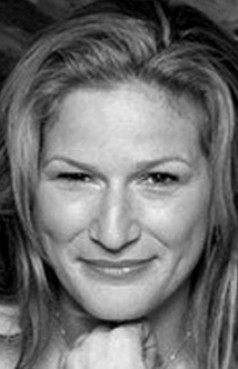 s best known for her incomparable work on “Saturday Night Live.” Ana can currently be seen on stage in the leading role as Elphaba in the Chicago production of the critically-acclaimed musical Wicked. Following her run in Eve Ensler's acclaimed Off-Broadway hit The Vagina Monologues, and her Broadway debut as “Columbia” in The Rocky Horror Show, she continued her work on the New York stage starring in Manhattan Theatre Club's hit production of Kimberly Akimbo by celebrated playwright David Lindsay-Abaire, as Fanny Brice in Funny Girl in a sold-out run at the Pittsburgh Civic Light Opera. On stage most recently, she starred in the NYC Opera's production of Cinderella and Off-Broadway opposite Anna Paquin in Roulette by Paul Weitz. On film, Ana has been seen in the recent blockbuster Mean Girls, What Women Want with Mel Gibson, Woman on Top, Dick, and What's The Worst That Could Happen? opposite John Leguizamo and Martin Lawrence.
s best known for her incomparable work on “Saturday Night Live.” Ana can currently be seen on stage in the leading role as Elphaba in the Chicago production of the critically-acclaimed musical Wicked. Following her run in Eve Ensler's acclaimed Off-Broadway hit The Vagina Monologues, and her Broadway debut as “Columbia” in The Rocky Horror Show, she continued her work on the New York stage starring in Manhattan Theatre Club's hit production of Kimberly Akimbo by celebrated playwright David Lindsay-Abaire, as Fanny Brice in Funny Girl in a sold-out run at the Pittsburgh Civic Light Opera. On stage most recently, she starred in the NYC Opera's production of Cinderella and Off-Broadway opposite Anna Paquin in Roulette by Paul Weitz. On film, Ana has been seen in the recent blockbuster Mean Girls, What Women Want with Mel Gibson, Woman on Top, Dick, and What's The Worst That Could Happen? opposite John Leguizamo and Martin Lawrence.
Cyndi Lauper (Jenny). 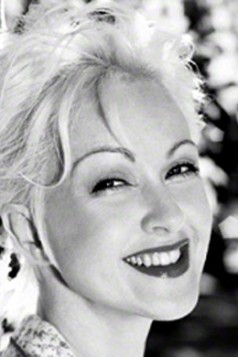 The vibrant talent of Cyndi Lauper has graced our world for 25 years. Beginning in 1980 Cyndi and her band at the time, Blue Angel released a self-titled album but in 1983 as many artists do, Cyndi decided to depart the group and take on the world as a solo artist. It was in 1984 with the release of her debut album, She's So Unusual that Cyndi scored massive success - 9 million copies sold worldwide - and quite literally became an overnight success. She's So Unusual was the first debut album and the first debut album by a solo artist to garner four top five singles, "Girls Just Want To Have Fun," "All Through The Night," "She Bop," and "Time After Time." She's So Unusual earned Cyndi a Grammy Award for Best New Artist. And this was just the beginning... In addition to proving herself as a Grammy-winning artist, Cyndi Lauper has spent much of the past twenty-five years as a devoted advocate and philanthropist for such organizations as AMFAR, Aids Research, Planned Parenthood, Women's Rights as well as for Gay communities all over the world. She has been twice nominated for the Emmy Award - has won once - and has established herself as one of America's most loved fashion icons. www.cyndilauper.com
The vibrant talent of Cyndi Lauper has graced our world for 25 years. Beginning in 1980 Cyndi and her band at the time, Blue Angel released a self-titled album but in 1983 as many artists do, Cyndi decided to depart the group and take on the world as a solo artist. It was in 1984 with the release of her debut album, She's So Unusual that Cyndi scored massive success - 9 million copies sold worldwide - and quite literally became an overnight success. She's So Unusual was the first debut album and the first debut album by a solo artist to garner four top five singles, "Girls Just Want To Have Fun," "All Through The Night," "She Bop," and "Time After Time." She's So Unusual earned Cyndi a Grammy Award for Best New Artist. And this was just the beginning... In addition to proving herself as a Grammy-winning artist, Cyndi Lauper has spent much of the past twenty-five years as a devoted advocate and philanthropist for such organizations as AMFAR, Aids Research, Planned Parenthood, Women's Rights as well as for Gay communities all over the world. She has been twice nominated for the Emmy Award - has won once - and has established herself as one of America's most loved fashion icons. www.cyndilauper.com
Nellie McKay (Polly) began recording her critically acclaimed debut album, a double-disc set entitled Get Away From Me in February 2004. Nellie’s stage credits include Lily in George F. Walker’s The End of Civilization, Louison in Moliere's The Imaginary Invalid, and the Cuckoo Clock in Pinocchio. In late 2003, she opened for Cyndi Lauper in a series of concert performances and, 2004, performed around the country and overseas. She opened for Sting in Switzerland, France, Spain and Germany and opened for the Barenaked Ladies and Alanis Morissette on that tour's northeast and west coast dates. Among her 2004 U.S. concert dates, Nellie opened for Lou Reed at Carnegie Hall. Nellie has also participated in benefits for groups ranging from Planned Parenthood to Fair Fund to the ACLU and most recently a benefit for Tibet House at Carnegie Hall. Nellie is currently recording her second studio album - in addition to working on television, theater and film projects and performing live at Lincoln Center as part of the Great American Songbook Series. www.NellieMcKay.com
The Threepenny Opera cast also features Christopher Innvar (Les Miserables, Victor/Victoria) as Tiger Brown, Carlos Leon (Aunt Dan and Lemon, Does a Tiger Wear a Necktie) as Filtch, and Brian Charles Rooney (The Ballad of Bonnie & Clyde, Pure Heaven: The Music of Kay Thompson) as Lucy.
The full cast also includes Adam Alexi-Malle, Terry Burrell, Brian Butterick, David Cale, Romain Frugé, John Herrera, Nehal Joshi, Christopher Kenney, Maureen Moore, Brooke Sunny Moriber, Deborah Lew, Valisia Lekae Little, Kevin Rennard and Lucas Steele.
Scott Elliott's Broadway credits include The Women, Three Sisters (both with the Roundabout Theatre Company, where he is an Artistic Associate), and Present Laughter. At the New Group, where is is Artistic Director, he has directed Aunt Dan and Lemon, The Women of Lockerbie, Comedians, Smelling a Rat, Ecstasy, Goose-Pimples, Curtains, Hazelwood Jr. High, East is East, Cranes, What the Butler Saw, Betwixt, and Andrew after Dark. Other credits: The Monogamist (Off-Broadway); The Ride Down Mt. Morgan, The End of the Day (Williamstown); and A Map of the World (film). Awards: OBIE, Lucille Lortel, Calloway, National Board of Review, Excellence in Independent Filmmaking.
The Threepenny Opera will feature choreography by Aszure Barton and musical direction by Kevin Stites. The design team for The Threepenny Opera includes Derek McLane (sets), Isaac Mizrahi (costumes), Jason Lyons (lights) and Ken Travis (sound).
For the history of The Threepenny Opera, please visit www.threepennyopera.org, courtesy of the Kurt Weill Foundation
The Threepenny Opera is sure to be a sensation and is a limited engagement - get your tickets today!
Lead support provided by our Musical Theatre Fund partners;
The Kaplen Foundation, John and Gilda McGarry, Tom and Diane Tuft.
Major support for this production provided by The Blanche and Irving Laurie Foundation, the
National Endowment for the Arts, and the Eleanor Naylor Dana Charitable Trust.
| Performance Schedule: |
March 24 - June 25, 2006
|
|
| Running Time: |
2 hours 50 minutes
|
|
| How To Buy Tickets: |
IN PERSON:
|
'Threepenny Opera' Brings Renewed Decadence to Studio 54
By BEN BRANTLEYAPRIL 21, 2006 | www.nytimes.com/
 AND you thought those crazy, hazy nights when Studio 54 sizzled were strictly a thing of the past. Think again, disco boys and girls. Why right now -- on the very spot where Halston, Liza, Bianca and Andy once held sybaritic court -- you can watch the same kinds of revels they might have witnessed in the 1970's, thanks to the shrill, numbing revival of "The Threepenny Opera" that opened at the theater at Studio 54 last night.
AND you thought those crazy, hazy nights when Studio 54 sizzled were strictly a thing of the past. Think again, disco boys and girls. Why right now -- on the very spot where Halston, Liza, Bianca and Andy once held sybaritic court -- you can watch the same kinds of revels they might have witnessed in the 1970's, thanks to the shrill, numbing revival of "The Threepenny Opera" that opened at the theater at Studio 54 last night.
Cross-dressed men and women in writhing sexual pretzels; leather boys and glitter queens vacuuming up piles of snow with their nostrils; strobe lights, neon lights and, yes, disco-ball lights. There's even a bare-chested hunk in a gold lamé bathing suit who arrives on a flying golden horse, summoning sweet memories of that fab birthday party for Bianca. (Or was it Liz?) All of this is once again on tap via the Roundabout Theater Company.
There's one big difference: nobody in the current incarnation of those days of swine and poses seems to be having any fun. This is one party where the hangover begins almost as soon as the evening does.
Almost two and a half years after the Roundabout's canny cash cow of a revival of "Cabaret" closed at Studio 54 (after more than five years in residence), the company is again inviting theatergoers to come to the cabaret, old chum. This time the occasion is Scott Elliott's production of the 1928 show that made musicals like "Cabaret" and "Chicago" possible: Bertolt Brecht and Kurt Weill's "Threepenny Opera" is the granddaddy of all the singing, stinging portraits of fat societies on their eves of destruction.
Mr. Elliott has even recruited one of the stars of the Roundabout "Cabaret," Alan Cumming, who won a Tony playing the ghoulish M.C. in the Kander-Ebb musical and who here portrays the murdering, whoring, stealing Macheath (Mac the Knife), the prince of thieves in stinking, corrupt London. But while it raises the kink quotient even higher than "Cabaret" did, this production has nothing like the same sustained point of view that might hook and hypnotize audiences. With Mr. Elliott overseeing a cast jam-packed with misused talent (including the pop stars Cyndi Lauper and Nellie McKay), this "Threepenny" takes Brecht's notion of the theater of alienation to new self-defeating extremes.
Created in the era in which "Cabaret" was set, "The Threepenny Opera" remains the most famous and popular example of what Brecht called "epic theater." Inspired by John Gay's rollicking "Beggar's Opera" (1728), "Threepenny" translated the tale of the villainous but irresistible Macheath and his marauders into the age of Queen Victoria. But the show's real satiric targets were the middle classes of poverty-crippled, rudderless Germany in the 1920's.
Using deliberately artificial techniques -- painted signs, scene-setting titles, spoken asides and musical-hall songs that often had little to do with the immediate plot -- the play was designed to sustain an intellectual distance, to allow audiences to see their own reflections in vicious thugs, whores, beggars and policemen motivated by the same primal needs and instincts as themselves. The music, Brecht wrote, was meant to become "an active collaborator in the stripping bare of the middle-class corpus of ideas."
An immediate, scandalous hit in Europe, "Threepenny" failed to generate the same frissons when it first arrived in New York in 1933. Writing of its Broadway premiere in The New York Times, Lewis Nichols described it as "a gently mad evening in the theater for those who like their spades in the usual nomenclature of the earnest." It wasn't until the fabled Off Broadway revival at the Theater de Lys in 1954 -- with Weill's widow, Lotte Lenya, as the prostitute Jenny -- that "Threepenny" achieved popular success in Manhattan.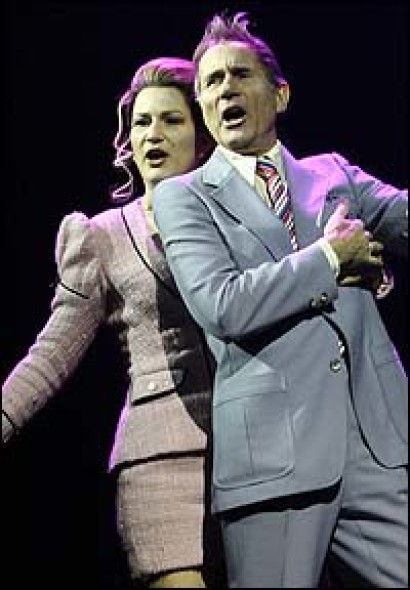
That production used a translation by Marc Blitzstein that is probably still the best-known English version but is regarded by purists as a softened and sanitized interpretation. Certainly no such complaints can be lodged against the new translation by the playwright Wallace Shawn, whose rendering is both more densely lyrical (with some cumbersome poetic tropes in the songs) and explicitly obscene than any I know. This is a show that doesn't hesitate to call sexual organs and acts by their most common names, loudly and repeatedly.
In the same spirit Mr. Elliott has chosen to make full use of a freedom from censorship that Brecht could only have envied. So in this version Macheath's love interests include not only the usual component of female whores (most notably Ms. Lauper as Jenny), but also their male counterparts.
Macheath again finds himself torn between two brides: the demi-virginal Polly Peachum (Ms. McKay) and Lucy Brown (Brian Charles Rooney). But in this case Lucy is a man, who makes a point of showing the audience exactly what lies beneath his skirt. Macheath's friendship with Tiger Brown (Christopher Innvar), Lucy's father and the chief of police, is of the crotch-grabbing, kissing kind. And for a copulatory free-for-all brothel sequence, the participants' underwear glows luridly beneath a black light. (Jason Lyons did the lighting, which allows for Brechtian signage to be writ in neon and L.C.D. supertitles.)
Isaac Mizrahi created the costumes here, in a smorgasbord of salacious styles, from a cleavage-flashing Chanel-style suit to the "Blue Angel"-style chanteuse get-ups worn by Ms. Lauper. Most of the clothes, plucked from racks on Derek McLane's naked it's-only-a-play set, suggest that their wearers have just come from frolicking in the back room of a leather bar. This includes Mr. Cumming's Macheath, who trades in the character's usual gentlemanly suit and bowler for a punkish ensemble and a Mohawk.
The performances are just as widely varied and as bereft of character-defining purpose. Everything seems done for isolated shock effect, without any regard to how one stylistic component might relate to another, so it's impossible to intuit exactly what society is being skewered.
Looking like Dietrich and sounding like a Brooklyn Piaf, Ms. Lauper delivers Jenny's ballads with teary, soulful intensity. She also leads, in Lenya-like style, the show's famous prologue, "Song of the Extraordinary Crimes of Mac the Knife." That marvelous trouper Jim Dale plays Mr. Peachum, Polly's father and the head of a vast network of beggars, in the seedy music-hall style of Laurence Olivier in "The Entertainer." As his wife, Ana Gasteyer talks like a shrill Scarsdale matron and sings penetratingly in a voice of a hundred trumpets.
Mr. Cumming brings much conviction and agony to Macheath's songs of the oppressed in the prison and hanging scenes. But there's little sense of the menacing charisma that keeps all of London atremble.
Ms. McKay, the inventive and seriously talented young singer-songwriter ("Get Away From Me"), comes closest to achieving a Brechtian effect. Clad in trailing pre-Raphaelite bridal white, her Polly speaks and sings with a flat, deadpan sincerity that suggests sugary blandness can accommodate a multitude of sins. It's a brave, carefully thought-out performance, though its willful affectlessness means that songs like "Pirate Jenny" (restored to Polly here, as in the original version) have no chance of being showstoppers.
The only songs delivered at full throttle are those that tell the audience members how rotten they are: "Certain Things Make Our Life Impossible," "How Do Humans Live?," "Cry From the Grave." But in presenting Brecht's lowlifes as exotic, feckless party animals instead of as pseudo-bourgeois materialists, Mr. Elliott keeps these characters at more of a distance from us than Brecht surely ever intended. Their censoriousness registers as just a random dip in a pharmaceutically induced roller coaster of moods. Another line of cocaine or two, and these hedonists will forget all about the poor and hungry.
The Threepenny Opera
By Bertolt Brecht and Kurt Weill. In a new translation by Wallace Shawn, based on Elisabeth Hauptmann's German translation of John Gay's "Beggar's Opera." Directed by Scott Elliott; music director, Kevin Stites; choreographed by Aszure Barton. Sets by Derek McLane; costumes by Isaac Mizrahi; lighting by Jason Lyons; sound by Ken Travis; hair and wig design by Paul Huntley; original orchestrations, Mr. Weill; music coordinator, John Miller; production stage manger, Peter Hanson; technical supervisor, Steve Beers; general manager, Sydney Beers; associate artistic director, Scott Ellis. Presented by the Roundabout Theater Company, Todd Haimes, artistic director; Harold Wolpert, managing director; Julia C. Levy, executive director. At Studio 54, 254 West 54th Street, (212) 719-1300. Through June 18. Running time: 2 hours 45 minutes.
WITH: Alan Cumming (Macheath), Jim Dale (Mr. Peachum), Ana Gasteyer (Mrs. Peachum), Cyndi Lauper (Jenny), Nellie McKay (Polly Peachum), Christopher Innvar (Tiger Brown), Carlos Leon (Filch) and Brian Charles Rooney (Lucy Brown).
Mack is Back as Threepenny Opera with Cumming, Lauper and Co. Opens on Broadway
BY ERNIO HERNANDEZ | www.playbill.com
APR 20, 2006
Alan Cumming returns to Broadway as "Mack the Knife" opposite Cyndi Lauper, Ana Gasteyer, Nellie McKay and Jim Dale in the Roundabout Theatre Company revival of The Threepenny Opera which opens April 20.
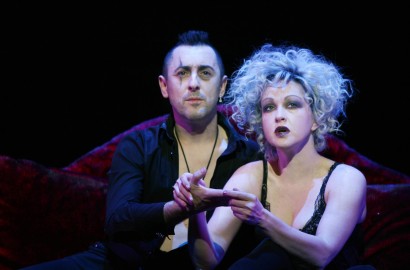
Alan Cumming and Cyndi Lauper in The Threepenny Opera. Joan Marcus
Scott Elliott (Hurlyburly, The Women) directs the world premiere translation, adapted by Wallace Shawn. The show began previews March 24 at Studio 54 for a limited run through June 18. Aszure Barton choreographs.
A mohawked Alan Cumming (Cabaret, Design for Living) stars as the infamous Macheath opposite pop songstress Cyndi Lauper (as Jenny) and fellow recording artist Nellie McKay (Polly) with stage veterans Ana Gasteyer (Wicked, The Rocky Horror Show) and Tony Award winner Jim Dale (Barnum, Joe Egg) (as Mrs. and Mr. Peachum) in the work based on the original Bertolt Brecht and Kurt Weill classic musical Die Dreigroschenoper.
Set in London in the 1800s, the The Threepenny Opera concerns a notorious bandit who marries a girl, much to the chagrin of her father. The peeved patriarch does everything in his power to imprison his son-in-law in this political and social satire. Director Elliott stages the two-act scene-and-song show with a nod to Brecht's signature style. (Shawn can be heard in voiceover.)
Elliott posed "I think, ultimately, it's always ripe for revival because the message of Threepenny Opera is severe; it's about the corruption of humanity and how men can consume other men. One of the lines in the play is 'The world hasn't changed' and that's from when? And now, don't we still say that?" (For more from the director and cast members, read Playbill.com's feature "Ripe for Revival: Creators and Cast of Threepenny Opera Make the Musical Modern".)
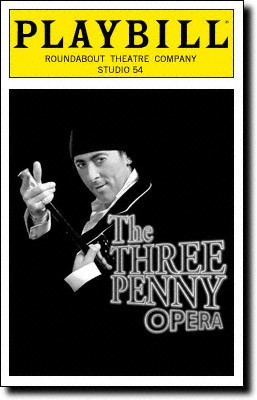
"I tried to get a cross section of humanity really," director Elliott explained to Playbill.com. "In this instance, because they have to sing and dance and act, it's kind of like the cross section of the entertainment community. So it's a very diverse group of people." Also in the The Threepenny Opera cast are Christopher Innvar (Les Miserables) as Tiger Brown, Carlos Leon (Aunt Dan and Lemon) as Filtch and Brian Charles Rooney (The Ballad of Bonnie & Clyde) as Lucy. The ensemble features Adam Alexi-Malle, Terry Burrell, Brian Butterick, David Cale, Romain Frugé, John Herrera, Nehal Joshi, Christopher Kenney, Maureen Moore, Brooke Sunny Moriber, Deborah Lew, Valisia Lekae Little, Kevin Rennard and Lucas Steele.
The design team for The Threepenny Opera features Derek McLane (sets), Isaac Mizrahi (costumes), Jason Lyons (lights) and Ken Travis (sound). Kevin Stites serves as the music director.
Fashion personality Mizrahi previously collaborated with director Elliott on the Roundabout's revival of The Women for his Broadway debut. He also joins the stage director for the Broadway revival of Barefoot in the Park.
Roundabout had previously announced the work in June 2003 for the 2004-2005 season, but later bumped it from the lineup. The Brecht-Weill work will again see the Broadway stage for the first time since 1989 when former "The Police" frontman Sting starred in 3 Penny Opera.
Actor-playwright Shawn last appeared on stage in Elliott's Off Broadway staging of David Rabe's Hurylyburly. He is known for his turns in the films "My Dinner With Andre," "The Princess Bride" and as the voice of Rex in the "Toy Story" movies. As a playwright, Shawn's works include Aunt Dan and Lemon, The Designated Mourner and Marie and Bruce. His screen adaptation of the latter, starring Matthew Broderick, is forthcoming.
Founding artistic director of Off-Broadway's The New Group, Elliott directed the current Broadway revival of Barefoot in the Park, Shawn's Aunt Dan and Lemon for his company and the 2001 Broadway revival of The Women for Roundabout. Other credits include Three Sisters, Present Laughter, Kiki & Herb: A Coup de Theatre, The Women of Lockerbie, Comedians and Smelling a Rat. A one time performer, he appeared on Broadway in Les Miserables and Ain't Broadway Grand.
Tickets to The Threepenny Opera at Broadway's Studio 54, located at 254 West 54th St., are available by calling Roundabout Ticket Services at (212) 719-1300 or online at www.roundabouttheatre.org.
By DAVID ROONEY | https://variety.com/
APRIL 20, 2006
Timing is everything. While any time is the right time for "The Threepenny Opera," the enterprise has been trumped by Broadway's riveting reinvention of "Sweeney Todd." Even without the stiff competition, the landmark musical would be a botched job this time around, directed and adapted with sledgehammer subtlety by Scott Elliott and Wallace Shawn, respectively.

With: Macheath - Alan Cumming Mr. Peachum - Jim Dale Mrs. Peachum - Ana Gasteyer Jenny - Cyndi Lauper Polly Peachum - Nellie McKay Tiger Brown - Christopher Innvar Filch - Carlos Leon Lucy Brown - Brian Charles Rooney
Given that it clobbers you over the head with surfaced subtext for nearly three hours, the show should come with a migraine warning. Elliott has taken his cue from the decadent past of the Studio 54 venue, piling on enough gutter glamour and chic perversion to animate a whole summer of gay circuit parties, plus a touring company or two of “The Rocky Horror Show.”
The deeply misguided, disco-dancing finale — with a muscle-boy royal messenger descending in gold hot pants and glitter boots on a neon horse to liberate Macheath — might tickle the coke-addled ghosts haunting the legendary temple of debauchery. But it won’t soothe the spirit of Bertolt Brecht.
The fundamental flaw here is that the material itself becomes secondary to the director’s imprint on it. In Brecht’s anticapitalist play — as in John Gay’s 18th-century “The Beggar’s Opera,” on which it was based — the distinctions are blurred between bourgeois society, with its corrupt, wealthy power brokers, and the criminal underworld of pimps, whores, cut-throats and thieves. Elliott blunts the satire by stridently accentuating the low-life depravity while neglecting to summon any real menace.
Some of the staging is effective. The “beggars” enter from the audience onto a naked stage, plucking costumes from racks and applying makeup during the overture. Jenny (Cyndi Lauper), the prostitute former lover of outlaw Macheath (Alan Cumming), begins the “Moritat” (here titled “Song of the Extraordinary Crimes of Mac the Knife”) unaccompanied, before being joined by the ensemble in a gruesome kickline under a jumble of multicolored neon identifying the play’s locations.
But things get bogged down immediately thereafter with the book scenes, which generally are flat and tedious. Shawn’s jokey adaptation trivializes the play into a lurid burlesque without texture, alternating moments of vaudeville and British music hall with sketch comedy and belabored illustrations of current relevance.
Warmongering gets a look in with a sing-along “Army Song” in which “new recruits learn to hate different cultures”; the recasting as a transvestite of Lucy Brown (Brian Charles Rooney), bisexual bigamist Macheath’s secret bride, allows for a nod to gay marriage; and, worst of all, consumer culture is ham-handedly lampooned in “The Ballad of the Happy Life,” when Macheath is joined by a chorus emblazoned with corporate brand names. Trailing them is that mascot of greed, Mrs. Peachum (Ana Gasteyer), here trussed up in a tarty faux-Chanel suit and Ivana Trump hairdo.
Shawn’s vulgarized lyrics (it becomes numbingly predictable that “China” will be rhymed with “vagina,” and “pluck” will beget “fuck”) lack the poetry and storytelling flow of, say, Marc Blitzstein’s translation. As always, Weill’s dissonant score remains the show’s chief enticement; the composer’s original orchestrations are vigorously played by a 10-member ensemble led by music director Kevin Stites.
Vocally, too, “Threepenny” is well served. Stepping in after Edie Falco dropped out due to “Sopranos” commitments, Lauper betrays a hint of impersonation in her Weimar warbling, but the pop diva knows how to command an audience in a song, which makes up for her slightly stiff acting. Her lovely, rueful take on “Solomon Song” benefits enormously from the simple staging. Likewise her betrayal tango with Macheath, “The Ballad of the Pimp,” one of the few places where Aszure Barton’s Fosse-macabre choreography doesn’t look mannered.
The Mohawk-coiffed Cumming can play sinister, lewd charm in his sleep, and the inevitable comparisons with his thrilling Emcee turn in “Cabaret” on the same stage a few years back make his casting less interesting. He too readily indulges the production’s tendency toward crotch-thrusting excess, so there’s nothing chilling about his winking Macheath as he courts the audience’s complicity. Cumming is best in back-to-back numbers near the close of the show, summoning bitter intensity when his survival is threatened in “Call From the Grave” and “The Ballad in Which Macheath Asks Everyone’s Forgiveness.”
Jim Dale brings wily vaudevillian humor to the unscrupulous Mr. Peachum, particularly in the jaunty “Song of Inadequacy of Human Striving.” As his venal wife, Gasteyer’s powerhouse pipes, coupled with her shrill comic characterization, become a little wearing. Doing distaff duty with smirking aplomb, Rooney displays a fine soprano on “The Jealousy Duet” and “Lucy’s Aria,” sung in German.The real surprise is singer-songwriter Nellie McKay, a genuinely odd and appealing stage presence who seems to have time-traveled in from another era. Dressed in dusty, corpse-bride white, and with her fresh-faced looks, dreamy eccentricity and sing-song dialogue delivery, McKay is an arresting match for Macheath’s young wife, Polly Peachum. She gets the balance of naivety and cunning just right, and her savvy spin on “Pirate Jenny” and “The ‘No’ Song” places them among the production’s better numbers.
Costumer Isaac Mizrahi appears to be channeling Vivienne Westwood with a dash of Versace. But the outre goth/punk fetishism of the outfits (Carlos Leon’s platform thigh boots and vinyl microshorts being the most over the top) feels more like an attention-grabbing Halloween dress-up stunt than a seriously subversive interpretation of the material. That flash-trash aspect pretty much echoes Elliott’s skin-deep investigation overall.
~~~~~~~~
The Threepenny Opera
Studio 54; 1,007 seats; $111.25 top
PRODUCTION: A Roundabout Theater Company presentation of a musical in two acts with book and lyrics by Bertolt Brecht, music by Kurt Weill, based on Elisabeth Hauptmann's German translation of John Gay's "The Beggar's Opera." English translation by Wallace Shawn. Directed by Scott Elliott. Music director, Kevin Stites. Choreography, Aszure Barton.
CREATIVE: Sets, Derek McLane; costumes, Isaac Mizrahi; lighting, Jason Lyons; sound, Ken Travis; hair and wigs, Paul Huntley; orchestrations, Weill; music coordinator, John Miller; production stage manager, Peter Hanson. Opened April 20, 2006. Reviewed April 14. Running time: 2 HOURS, 45 MIN.

